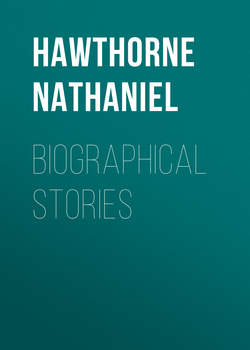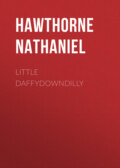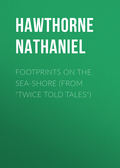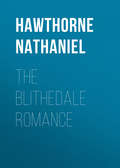BIOGRAPHICAL STORIES
This small volume and others of a similar character, from the same hand, have not been composed without a deep sense of responsibility. The author regards children as sacred, and would not, for the world, cast anything into the fountain of a young heart that might imbitter and pollute its waters. And, even in point of the reputation to be aimed at, juvenile literature is as well worth cultivating as any other. The writer, if he succeed in pleasing his little readers, may hope to be remembered by them till their own old age, – a far longer period of literary existence than is generally attained by those who seek immortality from the judgments of full-grown men.
CHAPTER I
When Edward Temple was about eight or nine years old he was afflicted with a disorder of the eyes. It was so severe, and his sight was naturally so delicate, that the surgeon felt some apprehensions lest the boy should become totally blind. He therefore gave strict directions to keep him in a darkened chamber, with a bandage over his eyes. Not a ray of the blessed light of heaven could be suffered to visit the poor lad.
This was a sad thing for Edward. It was just the same as if there were to be no more sunshine, nor moonlight, nor glow of the cheerful fire, nor light of lamps. A night had begun which was to continue perhaps for months, – a longer and drearier night than that which voyagers are compelled to endure when their ship is icebound, throughout the winter, in the Arctic Ocean. His dear father and mother, his brother George, and the sweet face of little Emily Robinson must all vanish and leave him in utter darkness and solitude. Their voices and footsteps, it is true, would be heard around him; he would feel his mother’s embrace and the kind pressure of all their hands; but still it would seem as if they were a thousand miles away.
And then his studies, – they were to be entirely given up. This was another grievous trial; for Edward’s memory hardly went back to the period when he had not known how to read. Many and many a holiday had he spent at his hook, poring over its pages until the deepening twilight confused the print and made all the letters run into long words. Then, would he press his hands across his eyes and wonder why they pained him so; and when the candles were lighted, what was the reason that they burned so dimly, like the moon in a foggy night? Poor little fellow! So far as his eyes were concerned he was already an old man, and needed a pair of spectacles almost as much as his own grandfather did.
And now, alas! the time was come when even grandfather’s spectacles could not have assisted Edward to read. After a few bitter tears, which only pained his eyes the more, the poor boy submitted to the surgeon’s orders. His eyes were bandaged, and, with his mother on one side and his little friend Emily on the other, he was led into a darkened chamber.
“Mother, I shall be very miserable!” said Edward, sobbing.
“O no, my dear child!” replied his mother, cheerfully. “Your eyesight was a precious gift of Heaven, it is true; but you would do wrong to be miserable for its loss, even if there were no hope of regaining it. There are other enjoyments besides what come to us through our eyes.”
“None that are worth having,” said Edward.
“Ah, but you will not think so long,” rejoined Mrs. Temple, with tenderness. “All of us – your father, and myself, and George, and our sweet Emily – will try to find occupation and amusement for you. We will use all our eyes to make you happy. Will they not be better than a single pair?”
“I will sit, by you all day long,” said Emily, in her low, sweet voice, putting her hand into that of Edward.
“And so will I, Ned,” said George, his elder brother, “school time and all, if my father will permit me.”
Edward’s brother George was three or four years older than himself, – a fine, hardy lad, of a bold and ardent temper. He was the leader of his comrades in all their enterprises and amusements. As to his proficiency at study there was not much to be said. He had sense and ability enough to have made himself a scholar, but found so many pleasanter things to do that he seldom took hold of a book with his whole heart. So fond was George of boisterous sports and exercises that it was really a great token of affection and sympathy when he offered to sit all day long in a dark chamber with his poor brother Edward.
As for little Emily Robinson, she was the daughter of one of Mr. Temple’s dearest friends. Ever since her mother went to heaven (which was soon after Emily’s birth) the little girl had dwelt in the household where we now find her. Mr. and Mrs. Temple seemed to love her as well as their own children; for they had no daughter except Emily; nor would the boys have known the blessing of a sister had not this gentle stranger come to teach them what it was. If I could show you Emily’s face, with her dark hair smoothed away from her forehead, you would be pleased with her look of simplicity and loving kindness, but might think that she was somewhat too grave for a child of seven years old. But you would not love her the less for that.
So brother George and this loving little girl were to be Edward’s companions and playmates while he should be kept prisoner in the dark chamber. When the first bitterness of his grief was over he began to feel that, there might be some comforts and enjoyments in life even for a boy whose eyes were covered with a bandage.
“I thank you, dear mother,” said he, with only a few sobs; “and you, Emily; and you too, George. You will all be very kind to me, I know. And my father, – will not he come and see me every day?”
“Yes, my dear boy,” said Mr. Temple; for, though invisible to Edward, he was standing close beside him. “I will spend some hours of every day with you. And as I have often amused you by relating stories and adventures while you had the use of your eves, I can do the same now that you are unable to read. Will this please you, Edward?”
“O, very much,” replied Edward.
“Well, then,” said his father, “this evening we will begin the series of Biographical Stories which I promised you some time ago.”
CHAPTER II
When evening came, Mr. Temple found Edward considerably revived in spirits and disposed to be resigned to his misfortune. Indeed, the figure of the boy, as it was dimly seen by the firelight, reclining in a well-stuffed easy-chair, looked so very comfortable that many people might have envied hun. When a man’s eyes have grown old with gazing at the ways of the world, it does not seem such a terrible misfortune to have them bandaged.
Little Emily Robinson sat by Edward’s side with the air of an accomplished nurse. As well as the duskiness of the chamber would permit she watched all his motions and each varying expression of his face, and tried to anticipate her patient’s wishes before his tongue could utter them. Yet it was noticeable that the child manifested an indescribable awe and disquietude whenever she fixed her eyes on the bandage; for, to her simple and affectionate heart, it seemed as if her dear friend Edward was separated from her because she could not see his eyes. A friend’s eyes tell us many things which could never be spoken by the tongue.
George, likewise, looked awkward and confused, as stout and healthy boys are accustomed to do in the society of the sick or afflicted. Never having felt pain or sorrow, they are abashed, from not knowing how to sympathize with the sufferings of others.
“Well, my dear Edward,” inquired Mrs. Temple, “is Your chair quite comfortable? and has your little nurse provided for all your wants? If so, your father is ready to begin his stories.”
“O, I am very well now,” answered Edward, with a faint smile. “And my ears have not forsaken me, though my eyes are good for nothing. So pray, dear father, begin.”
It was Mr. Temple’s design to tell the children a series of true stories, the incidents of which should be taken from the childhood and early life of eminent people. Thus he hoped to bring George, and Edward, and Emily into closer acquaintance with the famous persons who have lived in other times by showing that they also had been children once. Although Mr. Temple was scrupulous to relate nothing but what was founded on fact, yet he felt himself at liberty to clothe the incidents of his narrative in a new coloring, so that his auditors might understand them the better.
“My first story,” said he, “shall be about a painter of pictures.”
“Dear me!” cried Edward, with a sigh. “I am afraid I shall never look at pictures any more.”
“We will hope for the best,” answered his father. “In the mean time, you must try to see things within your own mind.”
Mr. Temple then began the following story: —
BENJAMIN WEST
[BORN 1738. DIED 1820]
In the year 1735 there came into the world, in the town of Springfield, Pennsylvania, a Quaker infant, from whom his parents and neighbors looked for wonderful things. A famous preacher of the Society of Friends had prophesied about little Ben, and foretold that he would be one of the most remarkable characters that, had appeared on the earth since the days of William Penn. On this account the eyes of many people were fixed upon the boy. Some of his ancestors had won great renown in the old wars of England and France; but it was probably expected that Ben would become a preacher, and would convert multitudes to the peaceful doctrines of the Quakers. Friend West and his wife were thought to be very fortunate in having such a son.
Little Ben lived to the ripe age of six years without doing anything that was worthy to be told in history. But one summer afternoon, in his seventh year, his mother put a fan into his hand and bade him keep the flies away from the face of a little babe who lay fast asleep in the cradle. She then left the room.
The boy waved the fan to and fro and drove away the buzzing flies whenever they had the impertinence to come near the baby’s face. When they had all flown out of the window or into distant parts of the room, he bent over the cradle and delighted himself with gazing at the sleeping infant. It was, indeed, a very pretty sight. The little personage in the cradle slumbered peacefully, with its waxen hands under its chin, looking as full of blissful quiet as if angels were singing lullabies in its ear. Indeed, it must have been dreaming about heaven; for, while Ben stooped over the cradle, the little baby smiled.
“How beautiful she looks!” said Ben to himself. “What a pity it is that such a pretty smile should not last forever!”
Now Ben, at this period of his life, had never heard of that wonderful art by which a look, that appears and vanishes in a moment, may be made to last for hundreds of years. But, though nobody had told him of such an art, he may be said to have invented it for himself. On a table near at hand there were pens and paper, and ink of two colors, black and red. The boy seized a pen and sheet of paper, and, kneeling down beside the cradle, began to draw a likeness of the infant. While he was busied in this manner he heard his mother’s step approaching, and hastily tried to conceal the paper.
“Benjamin, my son, what hast thou been doing?” inquired his mother, observing marks of confusion in his face.
At first Ben was unwilling to tell; for he felt as if there might be something wrong in stealing the baby’s face and putting it upon a sheet of paper. However, as his mother insisted, he finally put the sketch into her hand, and then hung his head, expecting to be well scolded. But when the good lady saw what was on the paper, in lines of red and black ink, she uttered a scream of surprise and joy.
“Bless me!” cried she. “It is a picture of little Sally!”
And then she threw her arms round our friend Benjamin, and kissed him so tenderly that he never afterwards was afraid to show his performances to his mother.
As Ben grew older, he was observed to take vast delight in looking at the lines and forms of nature. For instance, he was greatly pleased with the blue violets of spring, the wild roses of summer, and the scarlet cardinal-flowers of early autumn. In the decline of the year, when the woods were variegated with all the colors of the rainbow, Ben seemed to desire nothing better than to gaze at them from morn till night. The purple and golden clouds of sunset were a joy to him. And he was continually endeavoring to draw the figures of trees, men, mountains, houses, cattle, geese, ducks, and turkeys, with a piece of chalk, on barn doors or on the floor.
In these old times the Mohawk Indians were still numerous in Pennsylvania. Every year a party of them used to pay a visit to Springfield, because the wigwams of their ancestors had formerly stood there. These wild men grew fond of little Ben, and made him very happy by giving him some of the red and yellow paint with which they were accustomed to adorn their faces. His mother, too, presented him with a piece of indigo. Thus he now had three colors, – red, blue, and yellow, – and could manufacture green by mixing the yellow with the blue. Our friend Ben was overjoyed, and doubtless showed his gratitude to the Indians by taking their likenesses in the strange dresses which they wore, with feathers, tomahawks, and bows and arrows.
But all this time the young artist had no paint-brushes; nor were there any to be bought, unless he had sent to Philadelphia on purpose. However, he was a very ingenious boy, aid resolved to manufacture paint-brushes for himself. With this design he laid hold upon – what do you think? Why, upon a respectable old black cat, who was sleeping quietly by the fireside.
“Puss,” said little Ben to the cat, “pray give me some of the fur from the tip of thy tail?”
Though he addressed the black cat so civilly, yet Ben was determined to have the fur whether she were willing or not. Puss, who had no great zeal for the fine arts, would have resisted if she could; but the boy was armed with his mother’s scissors, and very dexterously clipped off fur enough to make a paint-brush. This was of so much use to him that be applied to Madame Puss again and again, until her warm coat of fur had become so thin and ragged that she could hardly keep comfortable through the winter. Poor thing! she was forced to creep close into the chimney-corner, and eyed Ben with a very rueful physiognomy. But Ben considered it more necessary that he should have paint-brushes than that puss should be warm.
About this period friend West received a visit from Mr. Pennington, a merchant of Philadelphia, who was likewise a member of the Society of Friends. The visitor, on entering the parlor, was surprised to see it ornamented with drawings of Indian chiefs, and of birds with beautiful plumage, and of the wild flowers of the forest. Nothing of the kind was ever seen before in the habitation of a Quaker farmer.
“Why, Friend West,” exclaimed the Philadelphia merchant, “what has possessed thee to cover thy walls with all these pictures? Where on earth didst then get them?”
Then Friend West explained that all these pictures were painted by little Ben, with no better materials than red and yellow ochre and a piece of indigo, and with brushes made of the black cat’s fur.
“Verily,” said Mr. Pennington, “the boy hath a wonderful faculty. Some of our friends might look upon these matters as vanity; but little Benjamin appears to have been born a painter; and Providence is wiser than we are.”
The good merchant patted Benjamin on the head, and evidently considered him a wonderful boy. When his parents saw how much their son’s performances were admired, they, no doubt, remembered the prophecy of the old Quaker preacher respecting Ben’s future eminence. Yet they could not understand how he was ever to become a very great and useful man merely by making pictures.
One evening, shortly after Mr. Pennington’s return to Philadelphia, a package arrived at Springfield, directed to our little friend Ben.
“What can it possibly be?” thought Ben, when it was put into his hands. “Who can have sent me such a great square package as this?”
On taking off the thick brown paper which enveloped it, behold! there was a paint-box, with a great many cakes of paint, and brushes of various sizes. It was the gift of good Mr. Pennington. There were likewise several squares of canvas such as artists use for painting pictures upon, and, in addition to all these treasures, some beautiful engravings of landscapes. These were the first pictures that Ben had ever seen, except those of his own drawing.
What a joyful evening was this for the little artist! At bedtime he put the paint-box under his pillow, and got hardly a wink of sleep; for, all night long, his fancy was painting pictures in the darkness. In the morning he hurried to the garret, and was seen no more till the dinner-hour; nor did he give himself time to eat more than a mouthful or two of food before he hurried back to the garret again. The next day, and the next, he was just as busy as ever; until at last his mother thought it time to ascertain what he was about. She accordingly followed him to the garret.
On opening the door, the first object that presented itself to her eyes was our friend Benjamin, giving the last touches to a beautiful picture. He had copied portions of two of the engravings, and made one picture out of both, with such admirable skill that it was far more beautiful than the originals. The grass, the trees, the water, the sky, and the houses were all painted in their proper colors. There, too, where the sunshine and the shadow, looking as natural as life.
“My dear child, thou hast done wonders!” cried his mother.
The good lady was in an ecstasy of delight. And well might she be proud of her boy; for there were touches in this picture which old artists, who had spent a lifetime in the business, need not have been ashamed of. Many a year afterwards, this wonderful production was exhibited at the Royal Academy in London.
When Benjamin was quite a large lad he was sent to school at Philadelphia. Not long after his arrival he had a slight attack of fever, which confined him to his bed. The light, which would otherwise have disturbed him, was excluded from his chamber by means of closed wooden shutters. At first it appeared so totally dark that Ben could not distinguish any object in the room. By degrees, however, his eyes became accustomed to the scanty light.
He was lying on his back, looking up towards the ceiling, when suddenly he beheld the dim apparition of a white cow moving slowly over his head! Ben started, and rubbed his eyes in the greatest amazement.
“What can this mean?” thought he.
The white cow disappeared; and next came several pigs, which trotted along the ceiling and vanished into the darkness of the chamber. So lifelike did these grunters look that Ben almost seemed to hear them squeak.
“Well, this is very strange!” said Ben to himself.
When the people of the house came to see him, Benjamin told them of the marvellous circumstance which had occurred. But they would not believe him.
“Benjamin, thou art surely out of thy senses!” cried they. “How is it possible that a white cow and a litter of pigs should be visible on the ceiling of a dark chamber?”
Ben, however, had great confidence in his own eyesight, and was determined to search the mystery to the bottom. For this purpose, when he was again left alone, he got out of bed and examined the window-shutters. He soon perceived a small chink in one of them, through which a ray of light found its passage and rested upon the ceiling. Now, the science of optics will inform us that the pictures of the white cow and the pigs, and of other objects out of doors, came into the dark chamber through this narrow chink, and were painted over Benjamin’s head. It is greatly to his credit that he discovered the scientific principle of this phenomenon, and by means of it constructed a camera-obscura, or magic-lantern, out of a hollow box. This was of great advantage to him in drawing landscapes.
Well, time went on, and Benjamin continued to draw and paint pictures until he had now reached the age when it was proper that he should choose a business for life. His father and mother were in considerable perplexity about him. According to the ideas of the Quakers, it is not right for people to spend their lives in occupations that are of no real and sensible advantage to the world. Now, what advantage could the world expect from Benjamin’s pictures? This was a difficult question; and, in order to set their minds at rest, his parents determined to consult the preachers and wise men of their society. Accordingly, they all assembled in the meeting-house, and discussed the matter from beginning to end.
Finally they came to a very wise decision. It seemed so evident that Providence had created Benjamin to be a painter, and had given him abilities which would be thrown away in any other business, that the Quakers resolved not to oppose his inclination. They even acknowledged that the sight of a beautiful picture might convey instruction to the mind and might benefit the heart as much as a good book or a wise discourse. They therefore committed the youth to the direction of God, being well assured that he best knew what was his proper sphere of usefulness. The old men laid their hands upon Benjamin’s head and gave him their blessing, and the women kissed him affectionately. All consented that he should go forth into the world and learn to be a painter by studying the best pictures of ancient and modern times.









